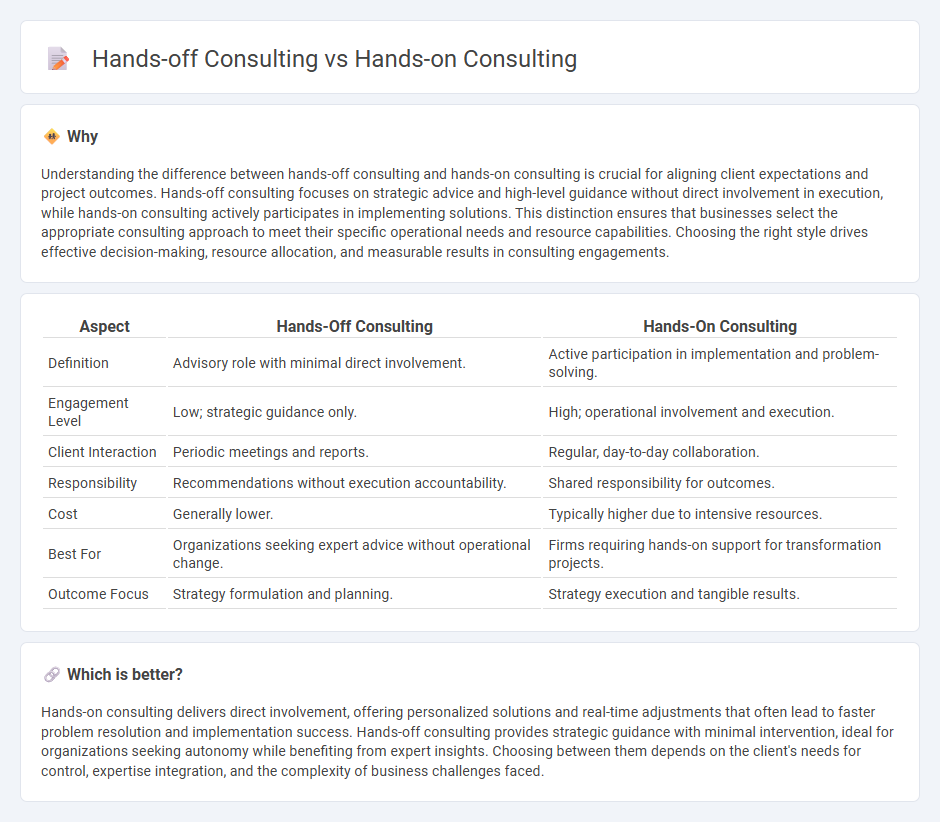
Hands-off consulting emphasizes strategic guidance and high-level advice, allowing clients to implement solutions independently, while hands-on consulting involves active participation in executing and managing projects alongside the client. Each approach serves different organizational needs, with hands-off suited for leaders seeking autonomy and hands-on ideal for teams requiring direct support and expertise. Explore the benefits and best practices of hands-off versus hands-on consulting to determine the ideal fit for your business challenges.
Why it is important
Understanding the difference between hands-off consulting and hands-on consulting is crucial for aligning client expectations and project outcomes. Hands-off consulting focuses on strategic advice and high-level guidance without direct involvement in execution, while hands-on consulting actively participates in implementing solutions. This distinction ensures that businesses select the appropriate consulting approach to meet their specific operational needs and resource capabilities. Choosing the right style drives effective decision-making, resource allocation, and measurable results in consulting engagements.
Comparison Table
| Aspect | Hands-Off Consulting | Hands-On Consulting |
|---|---|---|
| Definition | Advisory role with minimal direct involvement. | Active participation in implementation and problem-solving. |
| Engagement Level | Low; strategic guidance only. | High; operational involvement and execution. |
| Client Interaction | Periodic meetings and reports. | Regular, day-to-day collaboration. |
| Responsibility | Recommendations without execution accountability. | Shared responsibility for outcomes. |
| Cost | Generally lower. | Typically higher due to intensive resources. |
| Best For | Organizations seeking expert advice without operational change. | Firms requiring hands-on support for transformation projects. |
| Outcome Focus | Strategy formulation and planning. | Strategy execution and tangible results. |
Which is better?
Hands-on consulting delivers direct involvement, offering personalized solutions and real-time adjustments that often lead to faster problem resolution and implementation success. Hands-off consulting provides strategic guidance with minimal intervention, ideal for organizations seeking autonomy while benefiting from expert insights. Choosing between them depends on the client's needs for control, expertise integration, and the complexity of business challenges faced.
Connection
Hands-off consulting focuses on providing strategic guidance and expert advice without direct involvement in day-to-day operations, enabling clients to implement solutions independently. Hands-on consulting involves active participation in executing strategies, offering practical support and coaching to ensure successful implementation. Both approaches are interconnected through their common goal of enhancing business performance by tailoring the level of consultant engagement to client needs and project requirements.
Key Terms
Implementation
Hands-on consulting emphasizes active involvement in the implementation process, ensuring strategies are executed with real-time adjustments and expert guidance. Hands-off consulting provides strategic advice and high-level recommendations, leaving implementation responsibilities to the client's internal teams. Explore the advantages and limitations of each consulting style to determine the best fit for your business needs.
Advisory
Hands-on consulting involves active collaboration, guiding clients through implementation and troubleshooting, while hands-off consulting primarily offers strategic advice without direct involvement in execution. Advisory services in hands-off consulting emphasize expert recommendations, market analysis, and roadmap development to empower clients to make informed decisions independently. Explore key differences and best practices to optimize your consulting approach.
Client Autonomy
Hands-on consulting involves active collaboration where consultants work closely with clients to implement solutions, enhancing immediate skill transfer and project oversight. In contrast, hands-off consulting emphasizes client autonomy by providing strategic guidance while allowing clients to independently execute recommendations, fostering long-term self-reliance. Explore how balancing these approaches can optimize your business growth and operational efficiency.
Source and External Links
Hands on Consulting: Home - Specializes in delivering customer relationship skills training tailored for the hospitality and outdoor industry across Scotland, with additional offerings including Leave No Trace Eco training and First Aid Training.
Hands On Consulting - Provides consultation services focused on empowering clients to be 'hands on' in travel, including maximizing travel budgets and enhancing accessibility for Deaf and Hard of Hearing people through workshops, seminars, and instructional tools.
HANDSONCONSULTING LLC - Home - Founded in 2006, it offers marketing consulting services specializing in direct-to-consumer digital marketing and direct response television to increase product success, especially in the toy and consumer product sectors.
 dowidth.com
dowidth.com